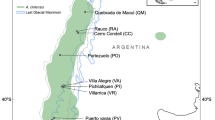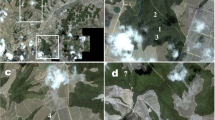Abstract
Isoenzymes were used to evaluate gene diversity and genetic differentiation among six populations of wild cherry (Prunus avium L.) in France. We contrast the genetic characteristics of a population resulting from a recent colonization with those of a much older population of the same species. No significant genetic structure was observed among populations; in this respect wild cherry does not differ from other forest trees. No founder effects could be detected in the newly colonized population. To explain the results, we discuss classic explanations for the lack of genetic differentiation among populations, including balancing selection and neutral drift/migration. In order to account for the absence of founder effects, we propose a hypothesis based on the life cycle of forest trees, namely that the length of the juvenile phase reduces the impact of small numbers of initial founders.
Similar content being viewed by others
Author information
Authors and Affiliations
Additional information
Received : 26 November 1996 / Accepted : 20 December 1996
Rights and permissions
About this article
Cite this article
Mariette, S., Lefranc, M., Legrand, P. et al. Genetic variability in wild cherry populations in France. Effects of colonizing processes. Theor Appl Genet 94, 904–908 (1997). https://doi.org/10.1007/s001220050494
Issue Date:
DOI: https://doi.org/10.1007/s001220050494




